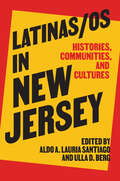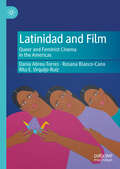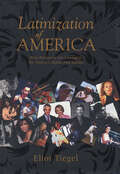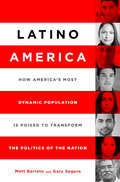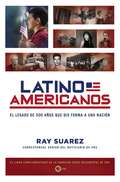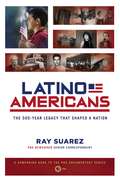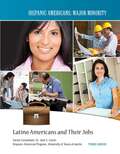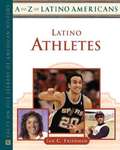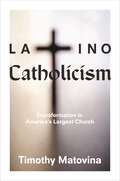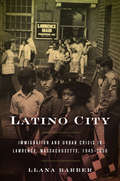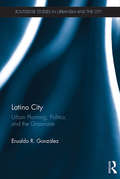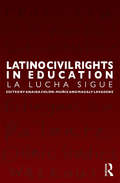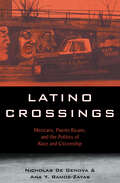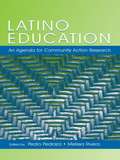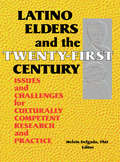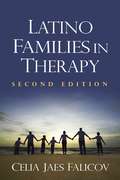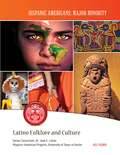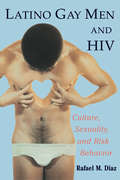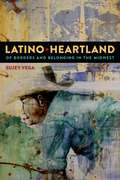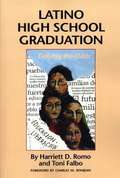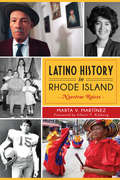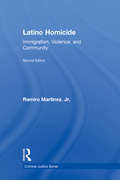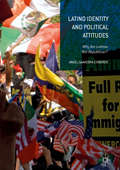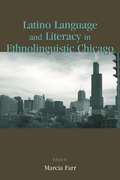- Table View
- List View
Latinas/os in New Jersey: Histories, Communities, and Cultures (CERES: Rutgers Studies in History)
by Lilia Fernandez Johana Londoño Ulla D. Berg Raymond Sanchez Mayers Ana Y. Ramos-Zayas Lyna L. Wiggins Kathleen López Yamil Avivi Benjamin Lapidus Aldo A. Lauria Santiago Olga Jiménez de Wagenheim Elsa Candelario Laura Curran Giovani Burgos Alex F. Trillo Anil Venkatesh Jennifer Ayala Giancarlo Muschi Ismael García Colón William Suárez Gómez Elena Sabogal Melanie Z. Plasencia Daniela ValdesSince the 1890s, New Jersey has attracted hundreds of thousands of Caribbean and Latin American migrants. The state’s rich economic history, high-income suburbs, and strong public sector have all contributed to attracting, retaining, and setting the stage for Latin American and Caribbean immigrants and secondary-step migrants from New York City. Since the 1980s, however, Latinos have developed a more complex presence in the state’s political landscape and institutions. The emergence of Latino-majority towns and cities and coalition politics facilitated the election of Latino mayors, council persons, and many social and community leaders, as well as the election of statewide officers. This collection brings together innovative and empirically grounded scholarship from different disciplines and interdisciplinary fields of study and addresses topics including the demographic history of Latinos in the state, Latino migration from gateway cities to suburban towns, Latino urban enclaves, Latino economic and social mobility, Latino students and education, the New Jersey Dream Act and in-state tuition act organizing, Latinos and criminal justice reform, Latino electoral politics and leadership, and undocumented communities. Contributors: Yamil Avivi; Jennifer Ayala; Ulla D. Berg; Giovani Burgos; Elsa Candelario; Laura Curran; Lilia Fernández; Ismael García Colón; Olga Jiménez de Wagenheim; Benjamin Lapidus; Aldo A. Lauria Santiago; Johana Londoño; Kathleen Lopez; Giancarlo Muschi; Melanie Z. Plasencia; Ana Y. Ramos-Zayas; Elena Sabogal; Raymond Sanchez Mayers; William Suárez Gómez; Alex F. Trillo; Daniela Valdez; Anil Venkatesh; Lyna L. Wiggins
Latinidad and Film: Queer and Feminist Cinema in the Americas
by Rosana Blanco-Cano Dania Abreu-Torres Rita E. Urquijo-RuizThis book provides an analysis of Latinidad in Latin American and U.S. Latinx films by women and/or LGBTQ directors from 1991 to 2016. Challenging traditional notions of gender roles, family, and national identities, it discusses how film directors are broadening the canon and producing provocative work that challenges the boundaries of identity. Utilizing a feminist and queer lens, this book is intended to demonstrate the dynamic interactions between individual agency, choices, and freedom from the communities represented. The book's organization in three parts reflects a common core of the Latin American and U.S. Latinx experiences, unifying all these films in the hope of creating a better understanding of these geographical regions and their people.
Latinization of America: How Hispanics Are Changing the Nation's Sights and Sounds
by Eliot TiegelLatinization of America provides a contemporary overview of the Hispanic population' s cultural impact in the United States. The author— a managing editor of Billboard magazine— explores the growth this community has on show business development as well as on the Spanish-speaking entertainment industry. Focusing on music, radio, TV, film, theater, dance, and sports— while also considering economic and political factors— the author tracks developments over the first decade of this century. Encompassing the various groups of immigrants who create new vistas of opportunity for both Spanish-speaking and mainstream entrepreneurs, this volume highlights the crossover and integration of Hispanics into competitive mainstream show business— and the rush by Anglo companies to grab their piece of the Latin pie.
Latino America: How America's Most Dynamic Population is Poised to Transform the Politics of the Nation
by Gary M. Segura Matt BarretoSometime in April 2014, somewhere in a hospital in California, a Latino child tipped the demographic scales as Latinos displaced non-Hispanic whites as the largest racial/ethnic group in the state. So, one-hundred-sixty-six years after the Treaty of Guadalupe Hidalgo brought the Mexican province of Alta California into the United States, Latinos once again became the largest population in the state. Surprised? Texas will make the same transition sometime before 2020. When that happens, America’s two most populous states, carrying the largest number of Electoral College votes, will be Latino. New Mexico is already there. New York, Florida, Arizona, and Nevada are shifting rapidly. Latino populations since 2000 have doubled in Alabama, Arkansas, Georgia, and South Dakota. The US is undergoing a substantial and irreversible shift in its identity. So, too, are the Latinos who make up these populations. Matt Barreto and Gary M. Segura are the country’s preeminent experts in the shape, disposition, and mood of Latino America. They show the extent to which Latinos have already transformed the US politically and socially, and how Latino Americans are the most buoyant and dynamic ethnic and racial group, often in quite counterintuitive ways. Latinos’ optimism, strength of family, belief in the constructive role of government, and resilience have the imminent potential to reshape the political and partisan landscape for a generation and drive the outcome of elections as soon as 2016.
Latino Americanos
by Ray SuarezEL LIBRO COMPLEMENTARIO DE LA CONOCIDA SERIE DOCUMENTAL DE PBS Latino americanos relata la rica y variada historia de los Latinos que han contribuido a darle forma a nuestra nación, y quienes se han convertido --con más de 50 millones de personas-- en la minoría más numerosa de los Estados Unidos. Este complemento de la conocida miniserie de PBS relata, de manera vívida y franca, cómo la historia de los lationamericanos es la historia de nuestro país. El aclamado periodista y autor Ray Suarez explora las vidas de hombres y mujeres latinoamericanos en un periodo de quinientos años, e incluye una gama épica de experiencias que abarca desde los primeros asentamientos europeos al Destino Manifiesto; del Salvaje Oeste a la Guerra Fría; de la Gran Depresión a la globalización; de la Guerra Hispano-Estadounidense al movimiento de los derechos civiles. Latino americanos comparte las luchas personales y los éxitos de inmigrantes, poetas, soldados y muchos otros: individuos que han causado un impacto en la historia y aquellos cuyas extraordinarias vidas iluminan la época en que vivieron, así como el legado de estos sensacionales estadounidenses.
Latino Americans
by Ray SuarezTHE COMPANION BOOK TO THE PBS DOCUMENTARY SERIES Latino Americans chronicles the rich and varied history of Latinos, who have helped shaped our nation and have become, with more than fifty million people, the largest minority in the United States. This companion to the landmark PBS miniseries vividly and candidly tells how the story of Latino Americans is the story of our country. Author and acclaimed journalist Ray Suarez explores the lives of Latino American men and women over a five-hundred-year span, encompassing an epic range of experiences from the early European settlements to Manifest Destiny; the Wild West to the Cold War; the Great Depression to globalization; and the Spanish-American War to the civil rights movement. Latino Americans shares the personal struggles and successes of immigrants, poets, soldiers, and many others-individuals who have made an impact on history, as well as those whose extraordinary lives shed light on the times in which they lived, and the legacy of this incredible American people. .
Latino Americans and Their Jobs (Hispanic Americans: Major Minority)
by Thomas ArkhamIn the United States, people of all different backgrounds live together. Today, more than one in eight people in the United States are Hispanic, and Latino communities are an important part America. Hispanic Americans are people from different lands, cultures, and backgrounds. Many come to the United States looking for better jobs--and some of them find them. No matter where Hispanic Americans came from originally, the longer they live in the United States, the better jobs they are likely to have. As they live in their new homes longer, they learn the language better; they make connections that can lead to job opportunities; and they gain a better understanding of what they have to offer in the work world. As you read the stories of individual Hispanic Americans, you will gain a better understanding of what it means to be a Latino in today's work world.
Latino Athletes
by Ian C. FriedmanA book about 175 Latinos who have made significant accomplishments in athletics in the U.S. and the world.
Latino Catholicism: Transformation in America's Largest Church
by Timothy MatovinaHow Latino Catholics and America are transforming each otherMost histories of Catholicism in the United States focus on the experience of Euro-American Catholics, whose views on social issues have dominated public debates. Latino Catholicism provides a comprehensive overview of the Latino Catholic experience in America from the sixteenth century to today, and offers the most in-depth examination to date of the important ways the U.S. Catholic Church, its evolving Latino majority, and American culture are mutually transforming one another.In Latino Catholicism, Timothy Matovina highlights the vital contributions of Latinos to American religious and social life, demonstrating in particular how their engagement with the U.S. cultural milieu is the most significant factor behind their ecclesial and societal impact.
Latino City: Immigration and Urban Crisis in Lawrence, Massachusetts, 1945–2000 (Justice, Power, and Politics)
by Llana BarberLatino City explores the transformation of Lawrence, Massachusetts, into New England's first Latino-majority city. Like many industrial cities, Lawrence entered a downward economic spiral in the decades after World War II due to deindustrialization and suburbanization. The arrival of tens of thousands of Puerto Ricans and Dominicans in the late twentieth century brought new life to the struggling city, but settling in Lawrence was fraught with challenges. Facing hostility from their neighbors, exclusion from local governance, inadequate city services, and limited job prospects, Latinos fought and organized for the right to make a home in the city. In this book, Llana Barber interweaves the histories of urban crisis in U.S. cities and imperial migration from Latin America. Pushed to migrate by political and economic circumstances shaped by the long history of U.S. intervention in Latin America, poor and working-class Latinos then had to reckon with the segregation, joblessness, disinvestment, and profound stigma that plagued U.S. cities during the crisis era, particularly in the Rust Belt. For many Puerto Ricans and Dominicans, there was no "American Dream" awaiting them in Lawrence; instead, Latinos struggled to build lives for themselves in the ruins of industrial America.
Latino City: Urban Planning, Politics, and the Grassroots (Routledge Studies in Urbanism and the City)
by Erualdo R. GonzalezAmerican cities are increasingly turning to revitalization strategies that embrace the ideas of new urbanism and the so-called creative class in an attempt to boost economic growth and prosperity to downtown areas. These efforts stir controversy over residential and commercial gentrification of working class, ethnic areas. Spanning forty years, Latino City provides an in-depth case study of the new urbanism, creative class, and transit-oriented models of planning and their implementation in Santa Ana, California, one of the United States’ most Mexican communities. It provides an intimate analysis of how revitalization plans re-imagine and alienate a place, and how community-based participation approaches address the needs and aspirations of lower-income Latino urban areas undergoing revitalization. The book provides a critical introduction to the main theoretical debates and key thinkers related to the new urbanism, transit-oriented, and creative class models of urban revitalization. It is the first book to examine contemporary models of choice for revitalization of US cities from the point of view of a Latina/o-majority central city, and thus initiates new lines of analysis and critique of models for Latino inner city neighborhood and downtown revitalization in the current period of socio-economic and cultural change. Latino City will appeal to students and scholars in urban planning, urban studies, urban history, urban policy, neighborhood and community development, central city development, urban politics, urban sociology, geography, and ethnic/Latino Studies, as well as practitioners, community organizations, and grassroots leaders immersed in these fields.
Latino Civil Rights in Education: La Lucha Sigue (Series in Critical Narrative)
by Anaida Colon-Muniz Magaly LavadenzLatino Civil Rights in Education: La Lucha Sigue documents the experiences of historical and contemporary advocates in the movement for civil rights in education of Latinos in the United States. These critical narratives and counternarratives discuss identity, inequality, desegregation, policy, public school, bilingual education, higher education, family engagement, and more, comprising an ongoing effort to improve the conditions of schooling for Latino children. Featuring the perspectives and research of Latino educators, sociologists, historians, attorneys, and academics whose lives were guided by this movement, the book holds broad applications in the study and continuation of social justice and activism today.
Latino Crossings: Mexicans, Puerto Ricans, and the Politics of Race and Citizenship
by Ana Yolanda Ramos-Zayas Nicholas De GenovaFirst published in 2003. Routledge is an imprint of Taylor & Francis, an informa company.
Latino Education: An Agenda for Community Action Research
by Pedro Pedraza Melissa RiveraThis landmark volume represents the work of the National Latino/a Education Research Agenda Project (NLERAP)-an initiative focused on school reform and educational research with and for Latino communities. NLERAP's goal is to bring together various constituencies within the broad Latino community who are concerned with public education to articulate a Latino perspective on research-based school reform, and to use research as a guide to improving the public school systems that serve Latino students and to maximizing their opportunities to participate fully and equally in all social, economic, and political contexts of society. Latino Education: An Agenda for Community Action Research conceptualizes and illustrates the theoretical framework for the NLERAP agenda and its projects. This framework is grounded in three overlapping areas of scholarship and activism, which are reflected within the chapters in this volume: critical studies, illuminating and analyzing the status of people of color in the United States; Latino/a educational research, capturing the sociohistorical, cultural, and political schooling experiences of U.S. Latino/a communities; and participatory action research, exemplifying a liberation-oriented methodology for truly transformative education. The volume includes both descriptive educational research and critical analyses of previous research and educational agendas related to Latino/a communities in the United States. According to current U.S. Census data, Latinos now comprise the largest minority group in the total U.S. population. Historically, reflecting larger sociohistorical and economic inequalities in U.S. society, the Latino community has not been well served by U.S. public school systems. More attention to the Latino students' educational issues is needed to redress this problem, especially given the tremendous population increase and projected growth of Latino communities in the U.S. Latino Education: An Agenda for Community Action Research is a major contribution toward this goal.
Latino Elders and the Twenty-First Century: Issues and Challenges for Culturally Competent Research and Practice
by Melvin DelgadoLatino Elders and the Twenty-First Century: Issues and Challenges for Culturally Competent Research and Practice will help social workers, researchers, and organizations identify and analyze ways of meeting the demands of the increasing number of elderly Latinos. Working from conceptual frameworks, case studies, and examples, this book provides you with a demographic picture of Latino elders and investigates the needs of ethnic-specific groups. Latino Elders and the Twenty-First Century will help you develop and create culturally competent intervention methods that take the culture, beliefs, and situations of Latino elders into consideration. Addressing the future challenges to individuals involved in the field of gerontology, this book offers you current studies on the assessment of present services for Latino elders, how they can be improved, and why these individuals may be reluctant to seek financial or medical help. Latino Elders and the Twenty-First Century will assist you in devising policies and programs aimed at improving services for Latino elders, including: providing Latino and non-Latino staff with an understanding of culturally competent principles, such as values, knowledge, and skills, that will help them give attention to individual and cultural needsimproving staff development by assessing issues and underlying causes of client problems using the self and other cultural awareness models to help professionals realize their own values, attitudes, and behaviorsexamining community resources, such as gift shops, clothing shops, and beauty parlors in Puerto Rican communities that offer interpreter services, integration of the lonely, and community leadership to the elderlyconsidering family structure and personal identification to facilitate access to health care servicesminimizing stress of caregivers by fully understanding how they identify their roles within their families, evaluating their needs and capacity as caregivers, and offering counseling approaches that recognize the dynamics of caregivingexamining contributing factors to substance abuse among elders and researching incidence, prevalence, patterns of use, etiology, and consequences of this behaviorLatino Elders and the Twenty-First Century explores the possibilities of further research in the areas of substance abuse among the elderly and the importance of businesses in ethnic communities to meet the growing needs of clients. In order to assist specific groups of Latinos, this book examines social and medical needs and services for Dominicans, Puerto Ricans, and Yaqui elders of Old Pascua. Latino Elders and the Twenty-First Century will help you develop culturally sensitive programs for individual clients and diminish barriers to service.
Latino Families in Therapy, Second Edition
by Celia Jaes FalicovSince its initial publication, this acclaimed work has provided a comprehensive conceptual framework and hands-on strategies for culturally competent clinical practice with Latino families and individuals. Practitioners and students gain an understanding of the family dynamics, migration experiences, ecological stressors, and cultural resources that are frequently shared by Latino families, as well as variations among them. Through in-depth case illustrations, the author shows how to apply a multicultural and social justice lens to assessment and intervention that draw on each client's strengths. Creative ideas are presented for addressing frequently encountered clinical issues and challenges at all stages of the family life cycle. New to This Edition *Reflects the ongoing development of the author's multidimensional model, including additional assessment/treatment planning tools (MECAmaps, MECA genograms and others). *Incorporates the latest clinical research and over a decade of social and demographic changes. *Chapter on working with geographically separated families, including innovative uses of technology. *Chapters on health disparities and on adolescents. *Expanded discussions of second-generation risks and strengths and of same-sex marriage, intermarriage, divorce, and stepparenting.
Latino Families in Therapy, Second Edition
by Celia Jaes FalicovSince its initial publication, this acclaimed work has provided a comprehensive conceptual framework and hands-on strategies for culturally competent clinical practice with Latino families and individuals. Practitioners and students gain an understanding of the family dynamics, migration experiences, ecological stressors, and cultural resources that are frequently shared by Latino families, as well as variations among them. Through in-depth case illustrations, the author shows how to apply a multicultural and social justice lens to assessment and intervention that draw on each client's strengths. Creative ideas are presented for addressing frequently encountered clinical issues and challenges at all stages of the family life cycle. New to This Edition *Reflects the ongoing development of the author's multidimensional model, including additional assessment/treatment planning tools (MECAmaps, MECA genograms and others). *Incorporates the latest clinical research and over a decade of social and demographic changes. *Chapter on working with geographically separated families, including innovative uses of technology. *Chapters on health disparities and on adolescents. *Expanded discussions of second-generation risks and strengths and of same-sex marriage, intermarriage, divorce, and stepparenting.
Latino Folklore and Culture (Hispanic Americans: Major Minority)
by Bill PalmerWhat do a ghost story, a wise saying, and a holiday celebration all have in common? They are all part of Latino folklore. Latino folklore ties Hispanic Americans to their families and to the larger Hispanic community. Folklore tells Latinos who they are. Hispanic Americans come from many backgrounds--but they share many of the same stories, proverbs, and holidays. Discover Latino folklore--and understand a little better what it means to be a Hispanic American.
Latino Gay Men and HIV: Culture, Sexuality, and Risk Behavior
by Rafael M. DiazWith research based on focus group and individual interviews in the United States, as well as a thorough and integrative review of the current literature, Latino Gay Men and HIV discusses the six main sociocultural factors in Latino communities -- machismo, homophobia, family cohesion, sexual silence, poverty and racism--which undermine safe sex practices. In an attempt to explain the alarmingly high incidence of unprotected intercourse in this population, this in-depth cultural and psychological analysis shows how an apparent incongruence between knowledge or intention and behavior can possess its own sociocultural logic and meaning.
Latino Heartland: Of Borders and Belonging in the Midwest
by Sujey VegaAddresses the politics of immigration, in the everyday lives of one communityNational immigration debates have thrust both opponents of immigration and immigrant rights supporters into the news. But what happens once the rallies end and the banners come down? What is daily life like for Latinos who have been presented nationally as “terrorists, drug smugglers, alien gangs, and violent criminals”? Latino Heartland offers an ethnography of the Latino and non-Latino residents of a small Indiana town, showing how national debate pitted neighbor against neighbor—and the strategies some used to combat such animosity. It conveys the lived impact of divisive political rhetoric on immigration and how race, gender, class, and ethnicity inform community belonging in the twenty-first century. Latino Heartland illuminates how community membership was determined yet simultaneously re-made by those struggling to widen the scope of who was imagined as a legitimate resident citizen of this Midwestern space. The volume draws on interviews with Latinos—both new immigrants and long-standing U.S. citizens—and whites, as well as African Americans, to provide a sense of the racial dynamics in play as immigrants asserted their right to belong to the community. Latino Hoosiers asserted a right to redefine what belonging meant within their homes, at their spaces of worship, and in the public eye. Through daily acts of ethnic belonging, Spanish-speaking residents navigated their own sense of community that did not require that they abandon their difference just to be accepted. In Latino Heartland, Sujey Vega addresses the politics of immigration, showing us how increasingly diverse towns can work toward embracing their complexity.
Latino High School Graduation: Defying the Odds
by Harriett D. Romo Toni FalboWhile high school drop-out rates have steadily declined among white and African American students over the last twenty years, a constant 35 percent of Latino students continue to quit school before graduation. In this pioneering work, Harriett Romo and Toni Falbo reveal how a group of at-risk Latino students defied the odds and earned a high school diploma. Romo and Falbo tracked the progress of 100 students in Austin, Texas, from 1989 to 1993. Drawing on interviews with the students and their parents, school records, and fieldwork in the schools and communities, the authors identify both the obstacles that caused many students to drop out and the successful strategies that other students and their parents pursued to ensure high school graduation. The authors conclude with seven far-reaching recommendations for changes in the public schools. Sure to provoke debate among all school constituencies, this book will be required reading for school administrators, teachers, parents, legislators, and community leaders.
Latino History in Rhode Island: Nuestras Raices (American Heritage)
by Marta V. Martínez Albert T. KlybergIn 1956, the Rosarios came to Providence and opened the first Hispanic food market in Rhode Island. This Dominican family's move signaled a new era of Latin American migration for the Ocean State. In the mid-1960s, Guatemalans came to Rhode Island as refugees from the dirty war at home, and Puerto Ricans arrived in the 1920s looking for agricultural work. From the Colombian factory workers who settled in Central Falls in the mid-1960s to the Cubans who fled Castro's revolution in the 1950s and 1960s, Latin Americans were flocking to the coastal towns and quaint neighborhoods of Rhode Island looking for brighter futures and a place to call home. Join author Marta V. Martinez as she turns a collection of oral histories into a fascinating story of the birth of Rhode Island's vibrant Latino community.
Latino Homicide: Immigration, Violence, and Community (Criminal Justice Series)
by Ramiro Martinez Jr.Latino Homicide is the first empirically based, but readable book for courses to counter the conventional wisdom that immigrant populations only contribute crime to their communities. For this second edition, Martinez further emphasizes his argument with updated data and the addition of a new city, San Antonio. With fascinating case studies from police reports and actual cases from six varied cities, Latino homicide rates are revealed to be markedly lower than one would expect, given the economic deprivation of these urban areas. Far from dangerous or criminal, these communities often have exceptionally strong social networks precisely because of their shared immigrant experiences. Martinez skillfully refutes negative stereotypes in a coherent and critically rigorous analysis of the issues.
Latino Identity and Political Attitudes: Why Are Latinos Not Republican?
by Angel Saavedra CisnerosThis book explores the forces that shape Latino political preferences, arguing that social identities are at the center of Latino partisanship. Despite hopes of the Republican Party for bringing in Latinos through religious and moral issues, Latinos in America consistently side with the Democratic Party. Two possible explanations based on social identity emerge as theories of Latino partisanship. The first possibility is that Latinos behave as a single-issue public driven politically by the issue of immigration. A thorough exploration of this possibility in part two of the book finds very little evidence to justify treating Latinos as a single-issue public. The second explanation, presented in part three, relies more heavily on the concept of social identities. Latino pan-ethnic identity emerges as one of multiple identities available to Latinos in America. These multiple, diverse, and overlapping identities are the force behind Latino partisanship. Latino ethnic identity trumps the impact of religious identities in making Latinos more Democratic.
Latino Language and Literacy in Ethnolinguistic Chicago
by Marcia FarrThis volume--along with its companion Ethnolinguistic Chicago: Language and Literacy in the City's Neighborhoods--fills an important gap in research on Chicago and, more generally, on language use in globalized metropolitan areas. Often cited as a quintessential American city, Chicago is, and always has been, a city of immigrants. It is one of the most linguistically diverse cities in the United States and home to one of the largest and most diverse Latino communities. Although language is unquestionably central to social identity, and Chicago has been well studied by scholars interested in ethnicity, until now no one has focused--as do the contributors to these volumes--on the related issues of language and ethnicity. Latino Language and Literacy in Ethnolinguistic Chicago includes: *ethnographic studies based in home settings that focus on ways of speaking and literacy practices; *studies that explore oral language use and literacy practices in school contexts; and *studies based in community spaces in various neighborhoods. It offers a rich set of portraits emphasizing language use as centrally related to ethnic, class, or gender identities. As such, it is relevant for anthropologists, sociologists, linguists, historians, educators and educational researchers, and others whose concerns require an understanding of "ground-level" phenomena relevant to contemporary social issues, and as a text for courses in these areas.
